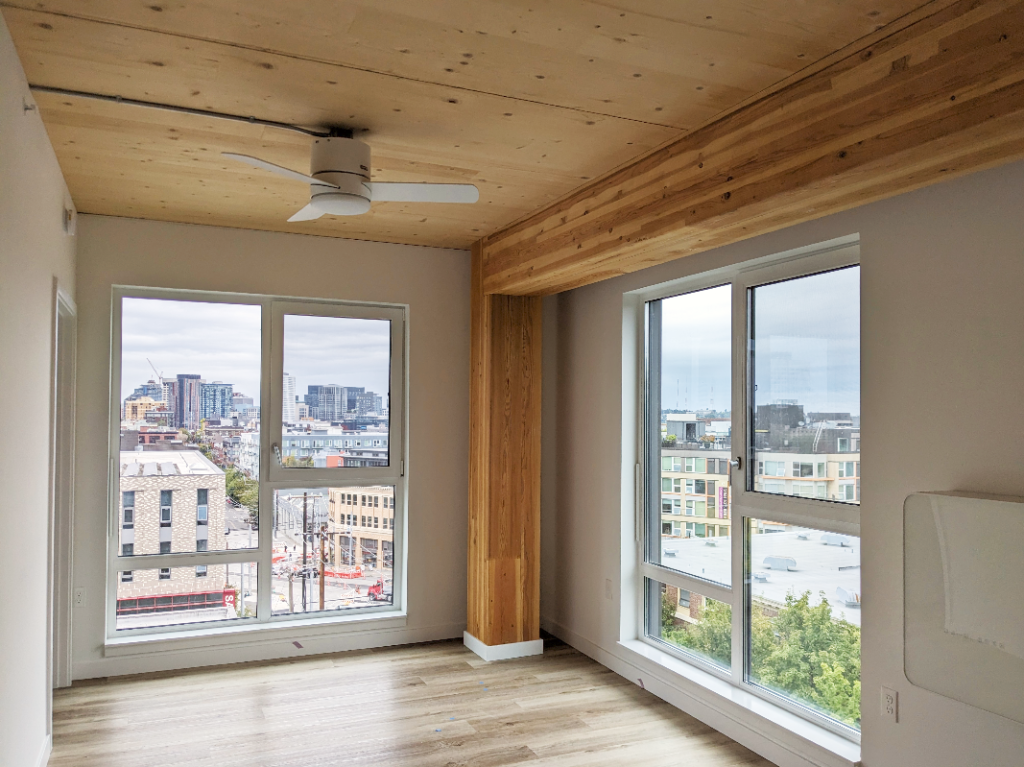Summarize this content to 2000 words in 6 paragraphs
A one-bedroom unit in Heartwood Apartments, a Seattle housing development targeting lower income renters. (GeekWire Photo / Lisa Stiffler)
A Seattle City Council committee today narrowly rejected an effort to create a 2% capital gains excise tax on profits over $262,000 made from the sales of stocks and bonds.
The vote was split 4-4 on the tax with one member abstaining. The amendment was debated in the Select Budget Committee, which includes the full council. It now advances without a “pass” recommendation as part of the 2025-26 budget package being considered on Thursday.
City Councilmember Cathy Moore proposed the tax, which was designed to pay for rental assistance, offer down-payment aid for low- and moderate-income households, and provide food assistance for those in need.
The budget has been carefully scrutinized, Moore told her fellow council members, and there are not opportunities for significant cuts — which necessitates new funding, in her view.
“We are, all of us up here, trying to maintain a high level of service and amenity and public safety in the city, and we are not slash-and-burn by any means,” she said. “So that does leave us at the point where we do need additional revenue.”
Some members of the tech and business community have pushed back on that assertion and challenged the need for new taxes. They also raised concerns that the tax could dampen the city’s economic competitiveness.
Others countered that the policy would not impact business and innovation, pointing to states such as California as having a higher tax burden yet maintaining a vibrant tech economy.
The council today also approved a measure that officially removes restrictions on how the Payroll Expense Tax on large businesses is spent.
The tax, known as JumpStart, was originally earmarked for addressing homelessness, equitable economic development, and environmental programs. It has also been tapped for general fund expenses every year since it started generating revenue in 2021 — a move that has sparked controversy given the original intention of the legislation.
The city is preparing to finalize its $8.3 billion budget. It includes $287 million collected through JumpStart that will be used to plug holes in the general fund.
Moore proposed the capital gains tax as a source of added revenue that wouldn’t burden lower-income residents the way a regressive sales tax does, for example.
The capital gains tax was projected to bring in between $16 million and $51 million per year.
Two council members opposing the tax said the benefits and impacts from current spending efforts were unclear and made it difficult for them to back the new revenue stream.
Moore’s pitch follows the state’s General Election in which Washington voters showed overwhelming support for retaining the 7% statewide capital gains tax that funds education.
The city tax would be implemented at a lower rate, but with otherwise identical language that limits its scope and applies only to profits that exceed a certain threshold, which last year was $262,000 and adjusts with inflation. Based on state tax filings from this year, the city version would have impacted 816 taxpayers.
Former Councilmember Alex Pedersen proposed a similar tax last year, and a capital gains tax was floated in 2021 as well.
Those voting for the tax were Councilmembers Moore, Dan Strauss, Tammy Morales and Joy Hollingsworth. Those against were Council President Sara Nelson and Councilmembers Maritza Rivera, Rob Saka and Robert Kettle.
Councilmember Tanya Woo, who lost a re-election bid earlier this month, abstained. The reason, she said, was due to ethical concerns because her husband is a stock trader. Woo said she wanted to address the issue before making her vote.
In making her final pitch for the tax, Moore emphasized that it was narrow in scope and not an income tax. The policy would apply to a narrow band of Seattle residents.
“I just want to try to put to rest any particular fears regarding we’re coming after the small pocketbook,” she said. “We are absolutely not.”
Some of the council members who voted against the tax Tuesday said they are open revisiting the idea in the future.
RELATED COVERAGE: A proposed capital gains tax in Seattle draws mixed response from tech leaders and city lawmakers
Editor’s note: Story updated at 3:40 p.m. Nov. 19 to clarify it was the Seattle City Council’s Select Budget Committee that voted against the amendment to create the capital gains tax. The committee includes all nine of the city council members. The council is expected to vote on the entire budget package on Thursday.












